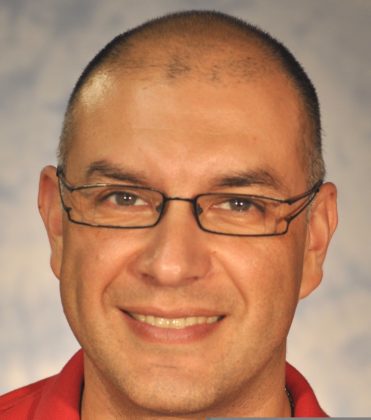“That cross represents you; it is very Diego!” she said. It was the first time that I had worn the Dehonian cross with the heart in the middle, my heart open.
-Br. Diego Diaz, SCJ
Br. Diego Diaz is an Argentine SCJ studying in the ESL program at Sacred Heart Seminary and School of Theology. Recently, he shared a reflection about his ministry with Open Door (“Puerta Abierta” in Spanish), an outreach program to women caught in human trafficking and prostitution. It is operated in in Buenos Aires by the Oblate Sisters of the Most Holy Redeemer. The center offers workshops, job training, social and psychological counseling, and other assistance to help women break free from exploitation. Br. Diego writes:

My work in the center goes back to 2011 when I was a university student studying psychology; I served as a volunteer. As a man, it was a personal challenge. I had to train, listen, learn, and relate in a new way with women. I had to learn again to go barefoot in sacred ground, leaving no marks, no footprints, and especially, to learn to be a channel of repair.
My tasks at the center were varied, including office and administrative work, the coordination of personal growth workshops and literacy training. This work allowed me to meet the people who work at the center and I began to understand the reality of women and their situation of marginalization. In our discussions, I saw that there were similarities between Oblate spirituality and Dehonian spirituality. Teamwork, reflection, and above all, the desire to help others, grew among us.
In my time with the center I acquired a transforming new language. Finding Jesus in these women was a strong foundational experience for me. One afternoon during team prayer my heart felt mobilized by the words of the Gospel: ” Truly I say to you, whatever you did for one of the least of these brothers and sisters of mine, you did it to Me.” (Mt. 25, 40)
The message touched my heart.
The experience of meeting with these women in moments of prayer became powerful. To hear them pray, to thank me – this opened my heart. I was challenged to be a different man. The Word of God came to me.
These women believed that God would take care of them, that God would be there for them. And here I was with my theology and psychology studies still questioning if God listened to me and was present in my day.
My questioning was answered during a party. One of the staff women from the center saw my Dehonian cross and said to me “That cross represents you; it is very Diego!”
It was the first time that I had worn the Dehonian cross with the heart in the middle, my heart open.
No doubt that Jesus came to meet me in the presence of that woman; Jesus spoke through her.
The experience of accompanying women in their empowerment, growth and liberation process nourished me in my daily prayer. These women, who previously were faceless victims of abuse and human trafficking, became individual people to me with names and faces. They had life stories that I learned about as I worked at the center.
The process of teaching women to read and write was a challenge that I thought was not for me. But by being an intermediary in the learning process I was able to connect more closely with the realities of these women who were writing for a child, writing for a mother, writing for a love.
Collaborating in an inter-congregational project helped me to see a new way of serving. Finding communion in various charisms is very enriching. It is a way of combining one’s own knowledge with others, finding the good in the other, seeing Jesus in the other. It is the same Holy Spirit that arouses a charism. We all share in this. The specific identities of charisms may be different, but they are all an expression of the same God who loves us and invites us to serve.
View previous feature stores

